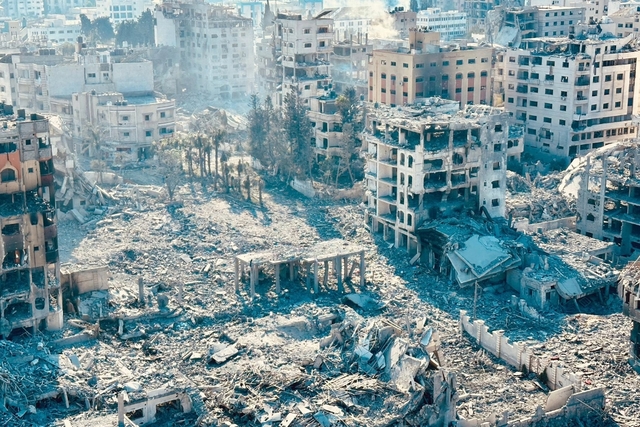World
Israel-Hamas War: Netanyahu Rejects General Ceasefire Despite Mounting International Pressure, Considers 'Tactical Pauses' In Gaza Conflict

Residential blocks destroyed during Israeli retaliatory strikes on the Gaza Strip (Photo: State of Palestine - MFA/X)
Israeli Prime Minister Benjamin Netanyahu has stated that Israel may consider "tactical pauses" in the Gaza conflict to facilitate aid delivery or hostage release but continues to reject calls for a general ceasefire, despite mounting international pressure.
Netanyahu, in a recent interview on US television, expressed his belief that Israel would need to maintain security control over Gaza for an indefinite period following the conflict.
While there have been calls for humanitarian pauses in the fighting, supported by Israel's top ally, the United States, Netanyahu argues that a comprehensive ceasefire would hinder Israel's military efforts.
He stated, "As far as tactical little pauses - an hour here, an hour there - we've had them before. I suppose we'll check the circumstances to enable humanitarian aid to come in or for the release of individual hostages. But I don't think there's going to be a general ceasefire."
Both Israel and Hamas, which controls Gaza, have resisted international pressure to declare a ceasefire.
Israel insists that hostages taken by Hamas during an attack on southern Israel in October must be released first, while Hamas refuses to release them or halt fighting while Gaza is under assault.
Since the conflict erupted, Israel has conducted airstrikes, imposed a blockade, and launched a ground offensive in Gaza, raising concerns about humanitarian conditions in the enclave.
According to the health ministry in Gaza, at least 10,022 Palestinians, including 4,104 children, have been killed.
International organisations have reported that hospitals are overwhelmed, and essential supplies such as food and clean water are running low, with aid deliveries falling far short of requirements.
The United Nations and various other organizations have called for an immediate humanitarian ceasefire, emphasizing the urgency of the situation.
The UN Secretary-General Antonio Guterres has warned that Gaza is becoming a "graveyard for children."
The United States, while pushing for temporary pauses in the conflict to allow aid to enter, shares Israel's concern that a complete ceasefire could enable Hamas to regroup.
US President Joe Biden discussed the possibility of humanitarian pauses and hostage releases with Netanyahu, reiterating his support for Israel while stressing the importance of protecting civilians.
The situation in Gaza remains a subject of concern at the United Nations. The Security Council has struggled to reach a consensus on a resolution, with a key obstacle being the terminology regarding a ceasefire, cessation of hostilities, or humanitarian pauses to facilitate aid access.
While there is growing international pressure to address the conflict, discussions about Gaza's future have yet to take place at the UN once the fighting subsides.
Netanyahu has suggested that Israel will maintain overall security responsibility for an indefinite period due to the perceived consequences of relinquishing such control.
Additionally, the US administration is planning to transfer $320 million worth of precision bombs to Israel, as reported by a reliable source.
Furthermore, Israel has launched strikes on Hezbollah targets in Lebanon in response to rocket attacks on northern Israeli cities.
This development follows ongoing clashes between Hezbollah and Israeli forces along the Lebanese-Israeli border since the commencement of the Hamas-Israel conflict on 7 October.
Hamas has also claimed to have launched missiles towards Israeli cities, including Nahariyya and Southern Haifa.
Support Swarajya's 50 Ground Reports Project & Sponsor A Story
Every general election Swarajya does a 50 ground reports project.
Aimed only at serious readers and those who appreciate the nuances of political undercurrents, the project provides a sense of India's electoral landscape. As you know, these reports are produced after considerable investment of travel, time and effort on the ground.
This time too we've kicked off the project in style and have covered over 30 constituencies already. If you're someone who appreciates such work and have enjoyed our coverage please consider sponsoring a ground report for just Rs 2999 to Rs 19,999 - it goes a long way in helping us produce more quality reportage.
You can also back this project by becoming a subscriber for as little as Rs 999 - so do click on this links and choose a plan that suits you and back us.
Click below to contribute.
Latest